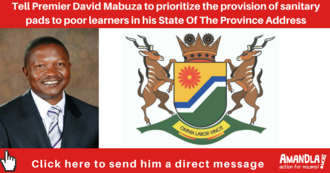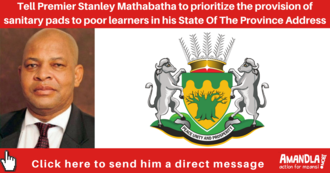- Featured
- Clean air
- Climate justice
- Consumer Rights
- Corporate Accountability
- Data access
- Early Childhood Development
- Economic fairness
- Education
- Electoral fairness
- Environmental justice
- Food justice
- Gender based violence
- Grants/social assistance
- Health
- Housing and infrastructure
- Industry interference
- Land Justice
- LGBTQIA+ rights
- Media/ information access
- Public transport
- Racism
- Reparations
- Safety
- Sanitation
- Service Delivery
- Sexual and Reproductive Rights
- Social justice
- Unemployment
- Womxn's rights/ gender equality
- Workers' rights
- More
-
GODONGWANA AND TOLASHE, INCREASE OLD AGE GRANT FOR OUR PENSIONERS!As of early 2026, the SASSA Old Age Grant is roughly R2,320 per month (or R2,340 for those over 75). Pensioners have formally petitioned Parliament to increase this to R5,000, stating that the current amount is "impossible" to live on. And these are the contributing factors. • High Inflation in Food prices and other essentials • High costs of electricity and other utilities • Old people are often on medication, so they sometimes have to pay for health care/medication out of their own pockets because our public health care is also not so great, and this requires money. Expecting pensioners to live on a meagre R2320 or R2340 is inhumane. Our country has high unemployment rates, and so sometimes, the money supports the entire family. Something has to be done about this. If more people speak up against this issue, the government will have to listen to us. Pensioners have been fighting and asking for a noticeable increase, but their cries have fallen on deaf ears. Old Pensioners, with the help of an organisation called The Givers, are planning to take the government to court. Please help them raise legal funds by contributing to their fund here: Bank Transfer: Any Monetory funds can be EFT to Absa Bank Cheque Account: 4103790948 Branch Code - 632005 The Givers Absa Bank Cell number: 0685809158 In-Person/In-Kind: WhatsApp Boeta Mogamat on 068580 9158 for collections or drop-offs Your generosity will directly go towards the pensioners' struggle. You can also email [email protected]. Donations of any size—whether monetary or in-kind will be highly appreciated. To learn more about The Givers and the work they do, you can view their website here: https://the-givers.lovable.app/?fbclid=IwVERTSAPehHFleHRuA2FlbQIxMABzcnRjBmFwcF9pZAwzNTA2ODU1MzE3MjgAAR690OEO98Eh-Yt7hRq6k0YifbjufpyNYIxydqtgxaRnkeGxgd96YBC3fFhwgA_aem_T7PSyVoGNi6p6lHKTAU1Kg101 of 200 SignaturesCreated by Mogamat Busby
-
We demand clean water and functional sewage systems in Dan Tloome and areas around itWhen the housing project began, it was intended to include sufficient greywater and sewage systems to serve the entire area; however, this has not been implemented. Currently, there are sewage problems in Dan Tloome, which also impact lower-lying areas near the housing project. As a result, when sewage overflows into stormwater pipes and contaminates boreholes—the only source of drinking water for these areas—our wetlands are polluted. The officials in charge of this housing project have failed, and continue to fail, the community of Dan Tloome and its surroundings, because residents are forced to live with poor sanitation conditions and drink contaminated water. There is no functioning sewage treatment plant in Randfontein due to a lack of maintenance, and it has been vandalised. Manholes are overflowing with raw sewage and flowing into nearby marshes, dams, and rivers, contaminating our underground drinking water. This supply is going to cause an outbreak of diseases and the killing of livestock. There is also a possibility that this spillage will end up in the Vaal River and dams, resulting in more people being vulnerable to diseases. Meetings were held with the municipality, and they assured us that they will keep a watchful eye on the situation to prevent any spillage. This was never done. Sewerage spillage had been active for many months and was not brought to our attention, remaining unreported for months until residents noticed the sewerage odour in the air and investigated. The situation has gotten worse now that it often rains. We need to come together and pressure the municipality into doing right by us. This is a clear violation of our human rights. We deserve clean water and functional sewage systems.426 of 500 SignaturesCreated by Carol Hefer
-
WE DEMAND THE CITY OF CAPE TOWN WITHDRAW THE UNCONSTITUTIONAL UNLAWFUL OCCUPATION BY-LAWThe unlawful occupation by-law, gazetted on the 14th of February 2022 undermines the constitution and circumvents the PIE ACT. This by-law deviates from the Human Settlements Strategy which provides that the City should “proactively plan for informality.” The Unlawful Occupation By-law contradicts this aim, it seeks to criminalise poor and working-class people who have fallen through the cracks of the city’s housing waiting list. The City’s by-law on unlawful land occupation seeks to bypass the protections of PIE. It also provides the so-called “City officials” with large amounts of arbitrary and discretionary power over poor and working-class people.270 of 300 SignaturesCreated by Aphiwe Ngalo
-
Lindiwe, what happened to the R600 million in Rent Relief?On 21 July 2020 the Minister of Human Settlements, Water and Sanitation Lindiwe Sisulu announced in her budget vote speech that her Department planned to allocate R600 million towards rental relief to tenants in affordable housing facing financial distress due to the COVID 19 pandemic. The funding, aimed at tenants in ‘formal affordable housing’ was meant to help those facing potential homelessness to meet their monthly rental obligations. This in turn would assist landlords who depended on rental income to survive. In her speech, the Minister made the undertaking that the details of the rent relief for such tenants would be published 30 days after her address.[2] IT IS NOW MORE THAN EIGHT MONTHS FOLLOWING THIS COMMITMENT AND NO DETAILS OF THE RELIEF SCHEME; NO POLICY PUBLISHED, AND NO FUNDING HAS BEEN RECEIVED BY TENANTS, WHO MAKE UP SOME OF THE PEOPLE HARDEST HIT BY THE PANDEMIC IN OUR COUNTRY. The stark reality is that between 2.2 and 3 million people lost their jobs in the first months of lockdown.[2] This has created a situation where households are caught in a double bind between maintaining their shelter and having enough food and water to stay alive. Correspondingly, the TPN Residential Rental Monitor for the fourth quarter of 2020 found that low end tenants had the weakest rental payment performance. Specifically, the report states that: “the “Less than R3,000/month” rental segment is populated by the most financially fragile tenant population, with significantly fewer financial “buffers” with which to weather any storms that translate into income loss, or those unexpected household expenses that arise periodically.” [3] In fact, the undertaking to provide R 600 million in rent relief was made to prevent the crisis that many of the 3 720 000 tenants [4] living in South Africa may now find themselves in. Albeit too little too late for tenants who have fallen victim to unlawful action by landlords and service providers across the country.[5] The consequences of these shortcomings taken together might be even more dire: on 9 March 2021, DA Shadow Minister of Cooperative Governance and Traditional Affairs, Mr Cilliers Brink announced that the party is calling for the urgent lifting of Alert Level 1 lockdown regulations stating that the regulations make it “close to impossible” for property owners to obtain eviction orders.[6] We are teetering on the brink of a secondary national disaster where we stand to exacerbate a health crisis into a homelessness crisis. The former UN Special Rapporteur on the Right to Housing Leilani Farha has cautioned that “[i]n the face of this pandemic, a lack of access to adequate housing is a potential death sentence for people living in homelessness”[7]. Home has rarely been more of a life or death situation – Housing remains Healthcare! JOIN US IN DEMANDING THAT THE NATIONAL DEPARTMENT OF HUMAN SETTLEMENTS, WATER AND SANITATION DO THEIR JOB URGENTLY. [1] https://www.gov.za/speeches/minister-lindiwe-sisulu-human-settlements-dept-budget-vote-202021-21-jul-2020-0000# [2]https://cramsurvey.org/wp-content/uploads/2020/07/Spaull-et-al.-NIDS-CRAM-Wave-1-Synthesis-Report-Overview-and-Findings-1.pdf [3]https://www.tpn.co.za/Group/Home/Media [4] http://www.statssa.gov.za/publications/P0211/P02114thQuarter2020.pdf [5] https://www.iol.co.za/personal-finance/government-needs-to-subsidise-tenants-rentals-50528669 http://www.statssa.gov.za/publications/P0318/P03182019.pdf [6]https://www.da.org.za/2021/03/da-calls-for-lifting-of-lockdown-regulations-to-restore-private-property-rights [7]https://www.ohchr.org/Documents/Issues/Housing/SR_housing_COVID-19_guidance_rent_and_mortgage_payers.pdf1,724 of 2,000 SignaturesCreated by Mpho Raboeane
-
Demand Corona Relief Fund be set up for precarious workers during the LockdownPrecarious workers make use of mass transport systems (taxis and buses) to get to and from work, areas the WHO and National Department of Health have deemed as high risk for infection. Furthermore, domestic workers and health care workers work in intimate spaces with people who are at high risk of COVID-19 infection, such as the elderly and people who have travelled to and from high-risk countries. However, due to the legacy of inequality, we continue to live in, these are the very same workers who will not be paid – and cannot afford – to self-quarantine. Without income, they also cannot afford healthy food or medication, making them even more vulnerable. We commend the Government for communicating around COVID-19, however, gaps remain in addressing the anxiety, fear and stigma related to infection. On top of the fear of dying, vulnerable workers reside in communities where the potential is high for stigmatisation and discrimination in the event of self-quarantine or being identified as having the virus. We believe that a successful response to COVID-19 requires unity among all who live in South Africa, and we aim to be part of a unified solution. That unified response, however, requires Government to take bold and deliberate steps to ensure that the most vulnerable members of society are cared for and have their dignity and livelihoods secured. COVID-19 will exacerbate inequality among the working class of this country as they do not have the choice to ‘work from home’ and they are subject to ‘no work no pay’ labour conditions. This is compounded by the fact that domestic workers and informal workers particularly still do not have access to the Compensation for Occupational Injuries and Diseases Act (COIDA) that other COVID-19 affected formal workers have. This means that domestic workers and informal workers cannot claim compensation in the event that they contract COVID-19 while at work. Given that we are officially under a national state of disaster, Mr President, we call for expedited access to the Unemployment Insurance Fund (UIF) for domestic workers and informal workers.830 of 1,000 SignaturesCreated by Coalition of Unions, Formal and Informal Workers, Organisations, Activists and other Allies
-
Save Msunduzi CityThe Msunduzi Local Municipality is dysfunctional and is on the brink of collapse and as residents and ratepayers of Msunduzi, hereby unanimously voice our strong and serious concern at the continued lack of effective and efficient delivery of basic services. We demand that the Msunduzi address and improve the service delivery issues and implement the auditor-general report recommendations of (2017-2018) by the 15 April 2019 failing which we, the long suffering residents and ratepayers of Msunduzi, will have no alternative but, in terms of Section 139 of our National Constitution, to motivate for National and Provincial intervention in the local government and management of Msunduzi, including that the Council be dissolved and the municipality placed under administration.5,663 of 6,000 SignaturesCreated by Anthony Waldhausen
-
Tell government to #StopTheAppeal and #FixOurSchoolsThe Norms and Standards law compels the government to fix sanitation in schools. Last month, in the Bhisho High Court, Acting Judge Nomawabo Msizi fixed the unconstitutional loopholes in this law, which allowed Basic Education Minister Motshekga to indefinitely delay fulfilling this obligation. The judgment meant that government would be fully bound to meet the deadlines set in the law. Instead of immediately beginning to improve school infrastructure, Cyril Ramaphosa’s government is now wasting desperately needed State resources and time to appeal the judgment. They are joined in this farce by the nine Education MECs. In the wake of Judge Msizi’s positive judgment, on 31 July EE leaders wrote to President Ramaphosa about the need to move forward in efforts to decisively address the ongoing backlog of dangerous and inadequate infrastructure in South Africa’s schools. Critically, we explained to him that we tried to avoid recourse to the courts, and had reached out to Minister Motshekga as early as February 2014 to raise issues about the unconstitutional wording of the Norms and Standards. In addition to our letter to the President, we wrote directly to the DBE. Both letters were not responded to. But yet again, government chooses to dodge its constitutional, legal and moral duties to #FixOurSchools. The decision to appeal the school infrastructure judgment jeopardises the fight for quality teaching and learning, and the immediate safety of learners. It is an incomprehensible and unconscionable collective dereliction of duty. Government is unwilling to release school infrastructure improvement plans timeously, forcing us to lodge a Promotion of Access to Information (PAIA) application. The State missed its date to file with the Polokwane High Court, a plan to eliminate pit latrines in Limpopo, as required in the Komape case judgment, - instead it filed a last minute application to extend the deadline set by the High Court. The time for debating the lives of South Africa's children in court must end!1,321 of 2,000 SignaturesCreated by Equal Education
-
Tell the City of Cape Town that we reject the budget and privatization of waterCape Town is being used as an international social experiment. Yes there is a drought but 'day zero' is a deliberate lie to justify the rapid privatization of water. The City used a formula that assumed it would not rain; it assumed that it would be windy and hot every day; they failed to consider that large agriculture was abusing water; day zero was flawed from the beginning. Now the international banks are using Cape Town to threaten other cities in SA and the rest of the world, to privatize water. That is why we need to join hands to stop the privatization of water in Cape Town * over 260 000 families (almost half of Cape Town) has already had water management devices forced onto us. * these limit the amount of water that households can use per day * the city aims to change to pre-paid water; in other words, no money, no water; they have already introduced this in parts of Grabouw *currently the real cost of water provision is R6 per kl; the City has increased this by 500% and want to increase it by a further 27-87 %. They want to charge high tariffs for water so the large banks can make pots of money. *the City wants to borrow from international banks for large scale projects such as desalination; the major part of the water budget will go to desalination, about R7.4 bn. In other words, the international banks will make profits out of water. Desalination puts our water into private hands, for profits; desalinated water has caused the death rate from heart attacks to double; it also makes fruit less nutritious. * just as the national govt increased electricity prices by 20% per year, the City wants to do the same with water. * many of the water management devices (over 16%) are defective; they are leaking and shut off, leaving thousands without water for basic needs; * many are getting huge bills of thousands and sometimes hundreds of thousands of Rands. *pressure is reduced in the pipes during the times that people need water; thousands are without water. *the City and other levels of govt knew more than 10 years ago they had to adopt water saving measures such as using recycled water for sanitation; they knew they had to recycle water for recharging aquifers; they knew they had to fix the infrastructure (the City loses 100 million litres per day through leaks). They failed. If we do not stop the privatization of water, the same high tariffs and poisonous desalination will be forced on more communities in SA and around the globe. The next generations will be paying huge tariffs for water. If you have no money, you will have no water. People will die as a result. The City must be stopped. The Water Crisis Coalition is marching to the City and to parliament on the 25th April 2018 at 10am from Keizergracht , at the end of Darling Street, opposite the castle. We want to hand over all signatures and petitions. We invite you to print copies of our petition and to bring them along on the day. Copies can be obtained via [email protected] Some useful references: Proof that Day zero formula was fake: https://drive.google.com/file/d/0B2Fo95AHFCN2bGdGWU1uajRHcDMxVFZUdFFObFU4djhuWFg0/view?usp=sharing Here is the downloadable leaflet which can be used as a free train ticket on the 25th April 2018, for the march. https://drive.google.com/file/d/0B2Fo95AHFCN2aThmWFRrdHZvYUhCNXp0ejFvX3piNHU3eVRZ/view?usp=sharing Joint Saftu-Water Crisis Coalition memorandum handed to the City on our demands on water 12 April 2018 https://drive.google.com/file/d/1xLVvvmRPzUZKJWFBxwGphhGFItJF6W0-/view?usp=sharing Downloadable petition which we will hand over to the Mayor on the 25th April 2018. Why not sign up your community or workplace? https://drive.google.com/file/d/0B2Fo95AHFCN2VVQ0OWYtSGNIWkNDeXVBWk9lcDk5ZFU5MVU4/view?usp=sharing Thesis on some of the 70 springs around Table Mountain https://etd.uwc.ac.za/bitstream/handle/11394/2686/Wu_MPHIL_2009.pdf?sequence=1&isAllowed=y Now the City wants to reduce the collection points for water at Newlands from 32 to 16. Let us march against this madness. Open the springs now. https://m.facebook.com/groups/320668791777159?view=permalink&id=355469214963783 Call by Reclaim Camissa on the need to preserve our springs http://thegreentimes.co.za/calling-government-conserve-groundwater-springs/ Reclaim Camissa site www.reclaimcamissa.org www.facebook.com/RECLAIMCAMISSA/ http://twitter.com/ReclaimCamissa There are a number of other petitions against the budget. We are not in competition with any of them but wish to bring our perspective forward. If you are not comfortable with signing our petition, here is a site which you can consider: https://www.dearcapetown.co.za/coct-budget/3,441 of 4,000 SignaturesCreated by Water Crisis Coalition
-
Provide basic services to informal settlements“When we think about using the toilet, we feel dirty. We feel like we don’t have human dignity, but we have nowhere else to live, so we just have to make the best of it. This is why we are building our own toilets.” Margret Mabene, Mzondi resident. Just recently, reports surfaced that people living in Mzondi informal settlement, Ivory Park, had started a crowdfund so that they could build toilets [1]. This desperation exists across many informal settlements that are scattered across South Africa's cities. Despite this, many people living in informal settlements are overlooked in service provision. There is a growing demand for living space around cities, and South Africa has housing backlogs. People living in informal settlements have rights. The need to grant them access to water and sanitation is a human rights issue. South Africa has the laws that force municipalities to provide basic services. Abahlali BaseMjondolo, in their Harry Gwala court case against the City of Ekurhuleni, are a good example of how people living in informal settlements have used the law to defend their rights. In this case, the people successfully argued that Ekurhuleni had a statutory obligation in terms of the Water Services Act, which requires a safe albeit temporary toilet for each stand, including in informal settlements [2]. It is important for ordinary South Africans to stand in solidarity with those who are marginalised. This is important for the advancement of justice and equity, ideals that are enshried in our Constitution. People living in informal settlements deserve dignity, like all human beings, irrespective of their material condition. [1] Community tries crowd funding to get toilets, Zoe Postman for GroundUp News. March 13, 2018. [2] The right to basic services in informal settlements: Notes on Harry Gwala High Court hearing 12 December 2008, Abahlali BaseMjondolo. Dec 15, 2008.5 of 100 SignaturesCreated by Amandla.mobi Member
-
Prioritize sustainable provision of sanitary pads in quintile 1-3 schools in MpumalangaOn average in Mzansi. a girl will miss 60 days of school because of her period [1]. And some are forced to use socks, newspapers and worse because they can’t afford sanitary pads. Over time this can cause girls to drop-out completely. If they struggle through, they often find themselves unable to fully take part in school activities. Last year, we watched as Parliament introduced Max, the flavoured condoms. While efforts aimed at reducing the rate of HIV/AIDS are commendable, we cannot ignore the plight of the girl child who loses her dignity and time for her studies for something she cannot opt out on. “You have to enable that child to go to school every day because the concern is that women are illiterate. If (not having access to) sanitary towels make girls not go to school, it should be your primary concern” ANC MP Patricia Chueu. [1] Dignity Dreams article with information on how many girls miss school a month and in a year: http://www.ngopulse.org/organisation/dignity-dreams5 of 100 SignaturesCreated by Amandla.mobi Member
-
Prioritize sustainable provision of sanitary pads in quintile 1-3 schools in the Northern CapeOn average in Mzansi. a girl will miss 60 days of school because of her period [1]. And some are forced to use socks, newspapers and worse because they can’t afford sanitary pads. Over time this can cause girls to drop-out completely. If they struggle through, they often find themselves unable to fully take part in school activities. Last year, we watched as Parliament introduced Max, the flavoured condoms. While efforts aimed at reducing the rate of HIV/AIDS are commendable, we cannot ignore the plight of the girl child who loses her dignity and time for her studies for something she cannot opt out on. “You have to enable that child to go to school every day because the concern is that women are illiterate. If (not having access to) sanitary towels make girls not go to school, it should be your primary concern” ANC MP Patricia Chueu. [1] Dignity Dreams article with information on how many girls miss school a month and in a year: http://www.ngopulse.org/organisation/dignity-dreams2 of 100 SignaturesCreated by Amandla.mobi Member
-
Prioritize sustainable provision of sanitary pads in quintile 1-3 schools in LimpopoOn average in Mzansi. a girl will miss 60 days of school because of her period [1]. And some are forced to use socks, newspapers and worse because they can’t afford sanitary pads. Over time this can cause girls to drop-out completely. If they struggle through, they often find themselves unable to fully take part in school activities. Last year, we watched as Parliament introduced Max, the flavoured condoms. While efforts aimed at reducing the rate of HIV/AIDS are commendable, we cannot ignore the plight of the girl child who loses her dignity and time for her studies for something she cannot opt out on. “You have to enable that child to go to school every day because the concern is that women are illiterate. If (not having access to) sanitary towels make girls not go to school, it should be your primary concern” ANC MP Patricia Chueu. [1] Dignity Dreams article with information on how many girls miss school a month and in a year: http://www.ngopulse.org/organisation/dignity-dreams17 of 100 SignaturesCreated by Amandla.mobi Member
.png)
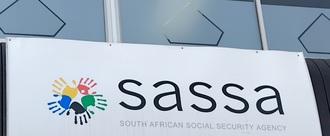

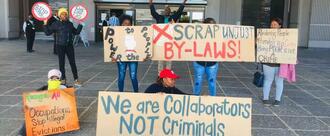

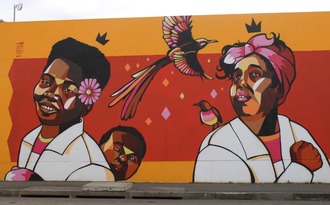


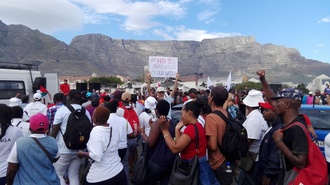
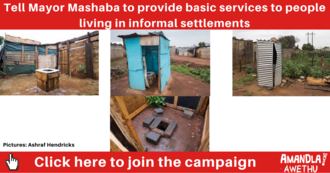.png)
